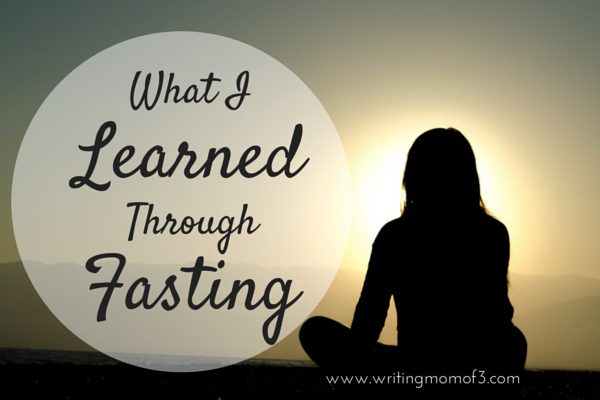
Fasting from food is a common spiritual practice found in Scripture. Time and again, believers “fast and pray” as they worship and seek the Lord. Jesus himself goes into the wilderness and fasts for 40 days and 40 nights.
So, what about fasting for us as modern-day believers? What’s it like to deprive oneself of food for a set period of time in order to seek God, to petition him, and to become more like Christ?
I remember as a young woman when a friend told me that she routinely fasted when she was struggling with something difficult. I remember she said something along the lines of “I get answers really quickly.”
Fast forward a few years and our entire (small) church committed to fasting for a church member who was awaiting a medical diagnosis. (All turned out well.)
Since then, I have, on occasion, fasted in order to pray and focus on a specific matter or concern among family and friends. I feel rather ill-equipped at doing so, though, because it’s just not something that comes up often at church. I mean, there’s not a Sunday school class on how to do it or anything.
Still, I want to press into the practice. I believe there’s a certain benefit in self-denial. I believe there are a lot of connections between fasting and deepening our faith.
So, as our family is praying through some tough vocational issues right now (and waiting on the Lord’s answers), I decided I would fast one day recently from two meals: breakfast and lunch. And I must confess, that going into this day of fasting, I did so with an unspoken (and somewhat subconscious) assumption that to fast meant to “pull out the big guns”—as if doing a fast would signal to God just how serious I really was about my prayers and my belief. Sadly, I sort of looked at it as a “magic bullet” type last-ditch attempt at coaxing God to my favor. If I’m being totally honest about my motivation to fast, I’d confess that I approached it with an attitude of, “Well if I’m really serious about petitioning God, then I’ll fast.”
But as the Lord often does, he took my sinful, self-centered attempts at piety and revealed to me more of himself, giving the entire experience greater meaning and deeper insight into my broken humanness and his glorious and gracious all-encompassing provision.
What the Lord Taught Me While Fasting
»Fasting is a tangible reminder of my frailty and dependence.
I like to think I’m so independent. And smart. And self-sufficient. Yet, a rumbly tummy is a constant reminder that I am but a meal away from unraveling. Something as basic as food—the need to feed—can have that much power over me? Truly, we are dependent upon our every breath, every heartbeat, every morsel from God.
»The physical hunger I have is but a shadow of the true hunger of my soul—to be fed and sustained by the Bread of Life.
That dull ache in the pit of my stomach would be temporarily relieved with a cheeseburger, but the hunger returns in a few hours. Jesus is the only thing that satisfies my deepest need. Until I am filled with him and only him, I will always be hungry.
»Temptation is greater when I am vulnerable, but Jesus’ power to overcome temptation is made perfect in my weakness.
I was working in the office at my part-time job as I did this last fast. The smell of Chinese take-out teased me from the breakroom. When you’re hungry and you’re purposely avoiding food, the temptation is far greater. It was easy to either berate or applaud myself for avoiding food that day (“just be done with it already; you’re hungry, what’s the big deal?” or “you are so awesome because you can smell all that food and you’re so strong; you don’t have to eat”). But even the enticing aromas of others’ lunches sent me back to Jesus. “What did he go through in the wilderness?,” I wondered. He had not missed 1 meal; he had missed 40 days’ worth! Because Jesus was tempted as we are tempted and overcame those temptations, we are able to overcome temptation. We have the power because we are hidden in him.
»When we (enabled and empowered by Jesus) push through suffering, we find indescribable strength on the other side of our pain.
Confronting the pain of hunger is but a glimpse of the pain Jesus endured so that I don’t have to. Jesus endured and persevered perfectly. Again, in him, we have access to his power. Even confronting a “light and momentary” pain as hunger makes the prospect of greater suffering less scary and less intimidating. “Practicing” the lesser pain of suffering in hunger not only makes us more like Christ, but also equips us for inevitable future trials.
»Fasting, very personally, relates to my sin struggles with emotional eating.
Even if you don’t struggle with food idolatry, my guess is that fasting somehow will make a personal connection for you and your sin (the Holy Spirit is just a great teacher like that—to connect the dots for us in ways that we least expect). For me, fasting from food breaks “the spell” of my sin. When I fast and feel the hunger and recognize the emotional connection food has on me, I see how I idolize it and put it in God’s place. Turning from food for a set period of time shows me that I do not have to be enslaved to my sin. I am a conqueror through Christ.
»Fasting puts me in constant communication with God.
When you’ve missed a meal, you know your stomach doesn’t quickly allow you to forget. A growling tummy, sharp stomach pains, a dull headache. Your body is screaming, “Feed me!” That’s why a fast is the perfect vehicle for becoming closer to God. With every growl, pain, and ache, I turn to God. When you are fasting from food, it’s—dare I say, “easy?”—to “pray without ceasing.”
We are still waiting on some answers and direction from the Lord on the topics about which I was praying and fasting. But as a result, I wait with deeper faith and greater hope because of having partaken in this spiritual discipline.
Have you ever fasted from food? I’d love to hear about your experiences and insights. How did God work in your heart and life during and after the fast?
How Is Your Quiet Time With God???
Click here to download a free report with practical tips and ideas for more consistent and meaningful quiet times.








 Facebook
Facebook Twitter
Twitter